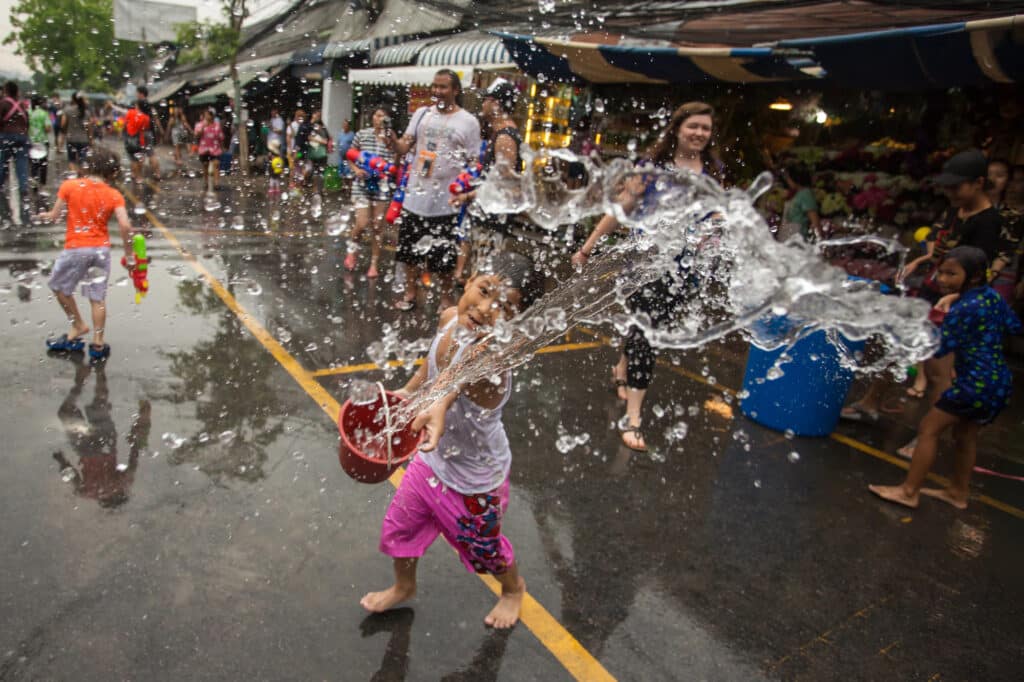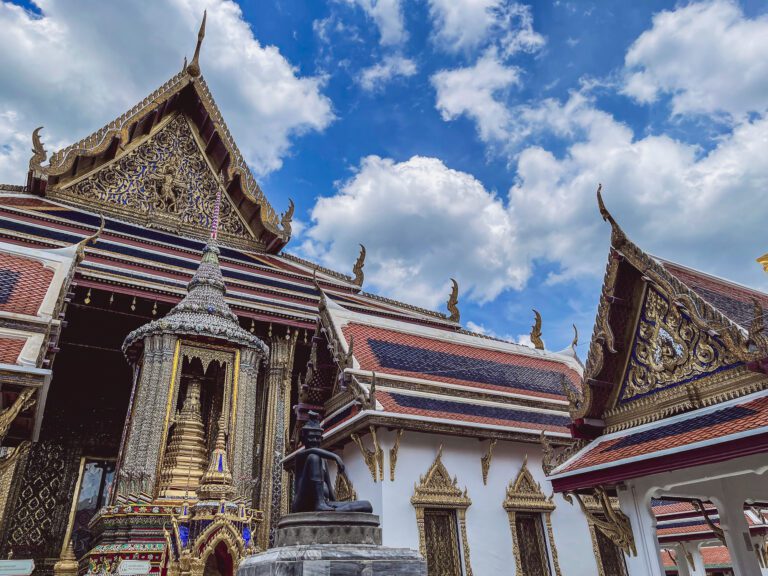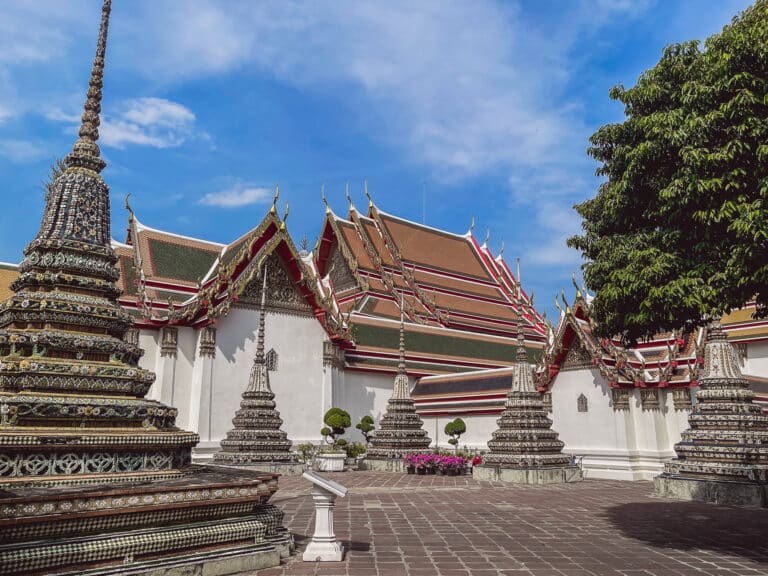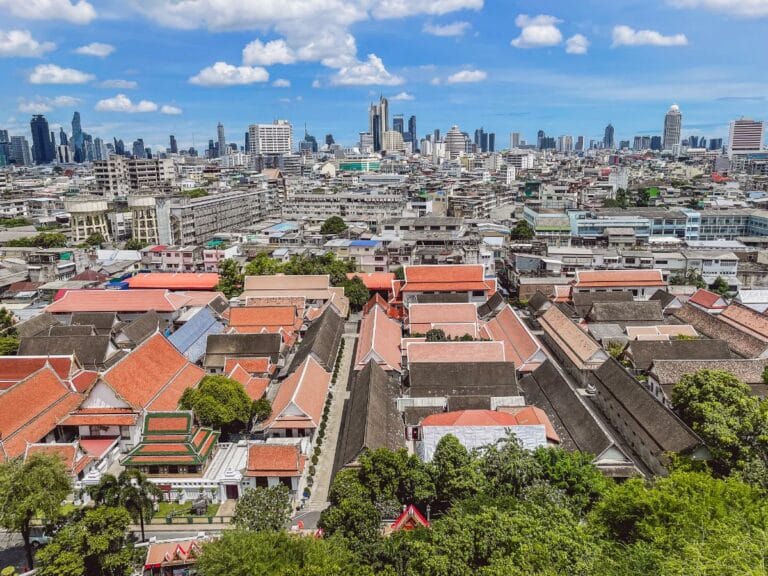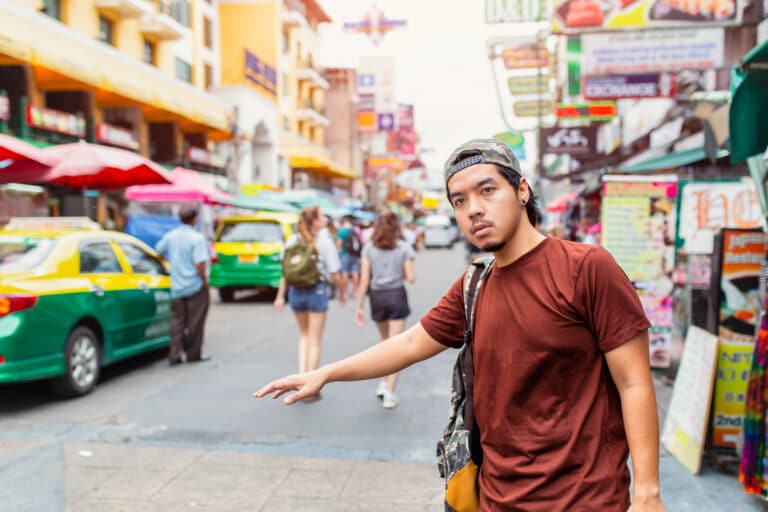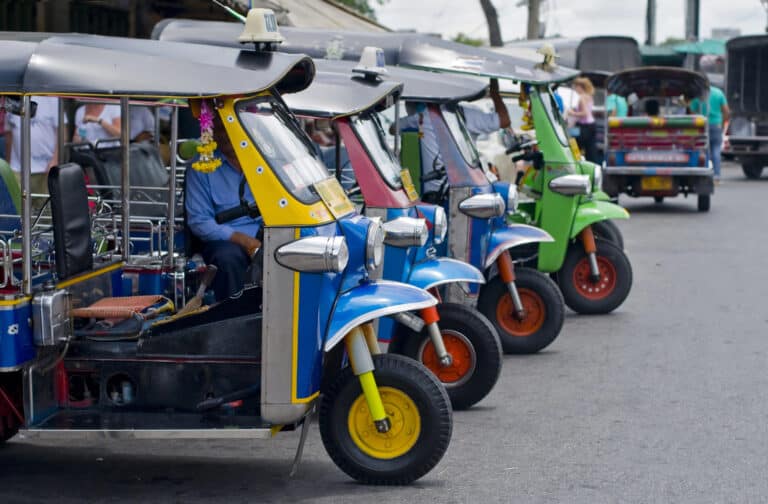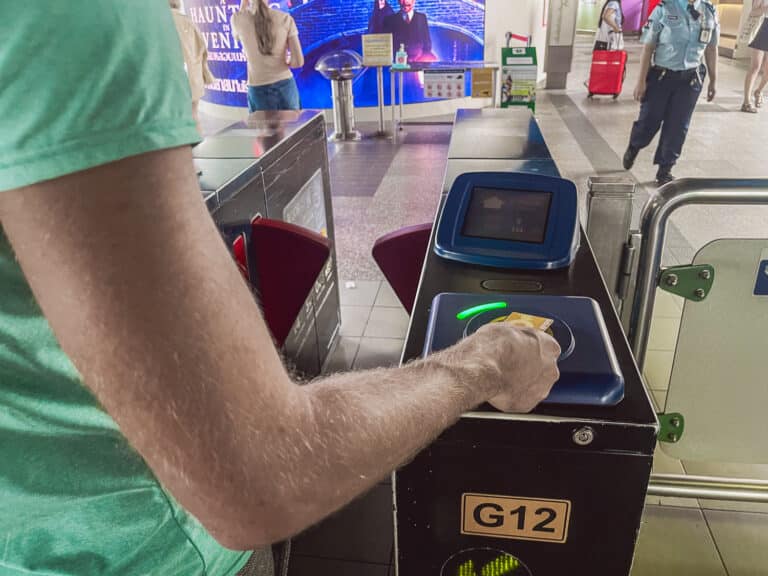Songkran in Bangkok: Experience the Thai New Year Festival
Songkran is one of the most famous and lively festivals in Thailand and marks the beginning of the traditional Thai New Year.
It is celebrated every year from April 13 to 15, although in some regions the celebrations last longer.
In Bangkok in particular, the city is transformed into a huge water festival that delights tourists and locals alike.
In this blog post, you will learn all about the significance of Songkran, the best locations for Songkran in Bangkok and how you can experience the festival as a tourist in the best possible way.
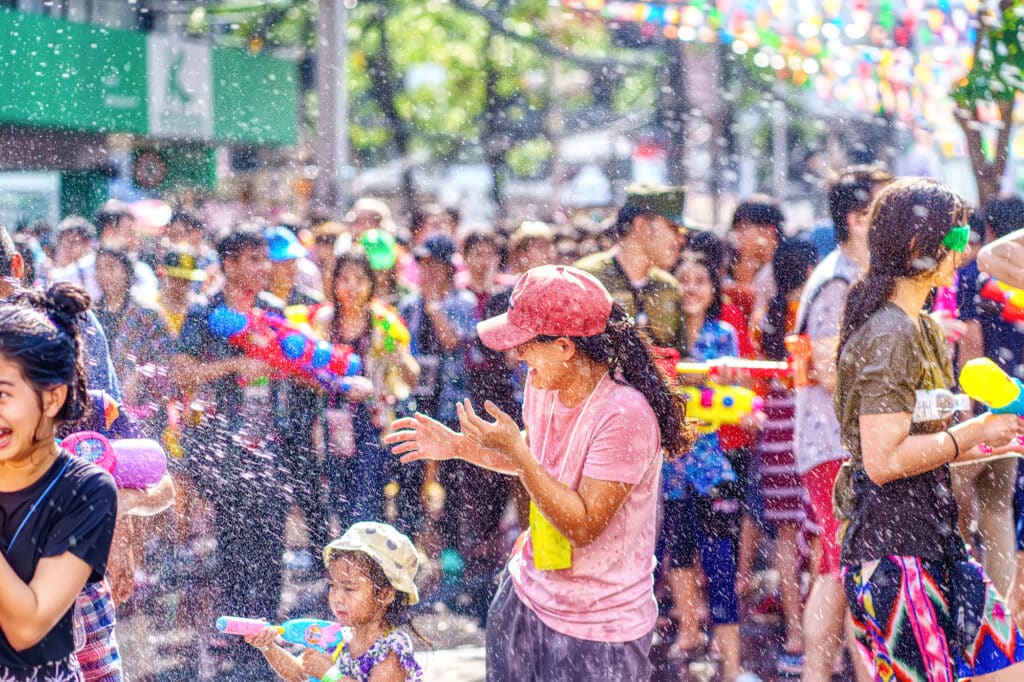
What is Songkran?
Songkran is the traditional Thai New Year and one of the most important festivals in the country.
The name “Songkran” comes from Sanskrit and means “transition”, which symbolizes the change into a new astrological year.
It is a festival of purification, renewal and new beginnings, characterized by both religious and secular elements.
Songkran was originally a contemplative festival with spiritual rituals, but over the years it has developed into a colorful and exuberant event that attracts people from all over the world.
When does Songkran take place?
Songkran is celebrated every year from April 13 to 15(more information on Bangkok weather in April).
These days are official public holidays in Thailand, but in some regions the celebrations last longer – sometimes up to a week.
The timing of the festival is in the hottest month of the year, making the water tradition at the heart of Songkran particularly refreshing and welcome.
The significance of Songkran
Songkran not only marks the beginning of the new year, but also a time of purification and renewal.
The festival is an opportunity to wash away bad karma and misfortune from the old year and start the new year with positive energy.
The traditions are deeply rooted in Buddhist culture and reflect respect for family, elders and religion.
Spiritual and cultural aspects
- Cleaning Buddha statues: At Songkran, Buddha statues are doused with fragrant water. This symbolizes purification and good luck for the coming year. Special ceremonies are held in many temples, where worshippers make offerings.
- Blessing the family: It is customary to pour water over the hands of older family members. This act, known as Rod Nam Dum Hua, symbolizes respect and gratitude. In return, the elders give their blessing for the New Year.
- Temple visits: Many Thais visit temples during Songkran to pray, make offerings and take part in traditional ceremonies.
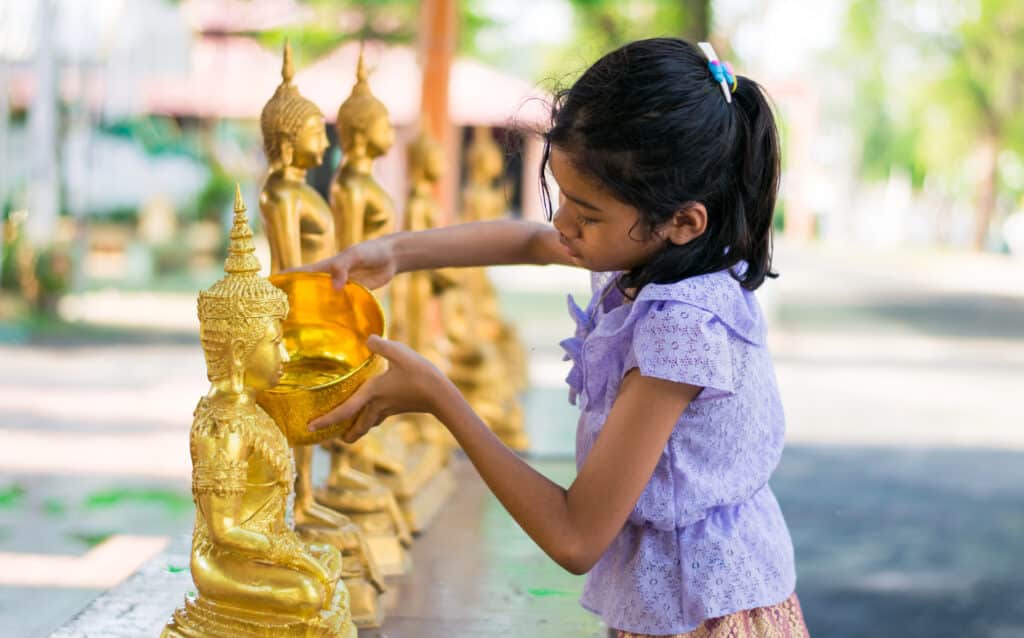
How did Songkran become a water festival?
The water used at Songkran has a deeply symbolic meaning. Originally, water was used sparingly to clean Buddha statues and gently poured on the hands of others.
Over time, however, this tradition developed into an exuberant water festival that provides fun and refreshment – especially in the hot season.
Splashing water has a double symbolism: it washes away the old and negative both physically and spiritually to make room for the new.
Today, the water is distributed over a large area with hoses, buckets and water pistols, making Songkran a unique spectacle.
Regional differences at Songkran
Although Songkran is celebrated throughout the country, there are regional differences in customs and the way it is celebrated:
- Bangkok: Here, boisterous water fights dominate Khao San Road and Silom Road.
- Chiang Mai: In the northern city, Songkran often lasts a week and is particularly famous for traditional ceremonies and parades.
- Pattaya: In Pattaya, Songkran, known as Wan Lai, often continues until April 19, accompanied by street parties and concerts.
Tip: This private tour of the city’s most important temples also takes you to Wat Arun, Wat Pho and the palace.
Songkran in Bangkok: a huge water festival
In Bangkok, Songkran takes on a whole new dimension. The city is transformed into a gigantic party zone where water is not only used symbolically, but also characterizes the streetscape in the form of exuberant water fights.
The festivities are a unique blend of tradition and modern fun.
Popular locations for Songkran in Bangkok
- Khao San Road
Khao San Road is the epicenter of the Songkran festivities in Bangkok. Here you will find countless locals and tourists, armed with water pistols, engaging in exuberant water fights. The atmosphere is lively, loud and full of energy. - Silom Road
Silom Road is one of the biggest party zones for Songkran in Bangkok. With thousands of revelers lining the entire street, water is distributed here in torrents – whether with water pistols, buckets or from hoses. - CentralWorld Plaza
A huge stage is set up in front of the CentralWorld shopping center, where DJs and live bands provide the atmosphere. Here you can enjoy Songkran with music and dancing – perfect for anyone looking for a combination of party and tradition. - Siam Square
Siam Square is particularly popular with the younger generation. This is where tradition meets modern lifestyle, with themed events, music and water activities. - Temple visits in the old town
In addition to the exuberant celebrations, there is also the opportunity to experience Songkran in a more traditional way in Bangkok’s old town. Visit temples such as Wat Pho or Wat Arun to take part in ritual purifications.
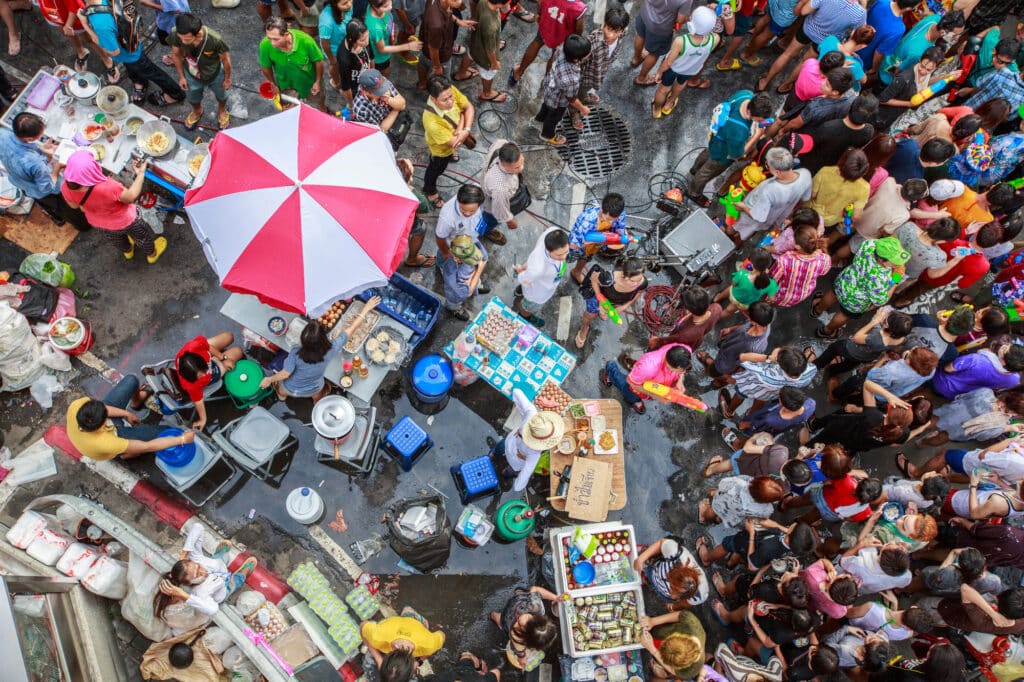
Tips for tourists: How to best experience Songkran
Songkran is an unforgettable experience that brings you closer to Thai culture in a lively and unique way.
With these tips, you are well equipped to be part of the festivities and at the same time treat the traditions with respect.
1. the right preparation
- Waterproof clothing: Put on light, quick-drying clothing that can get wet. Cotton or functional fabrics are ideal.
- Waterproof protection for valuables: Keep your cell phone, money and keys in waterproof bags or pouches. These are available on site at many stands.
- Sunscreen: Songkran takes place during the day and the sun can be intense. So don’t forget to apply sunscreen and pack a hat.
2. the right equipment
- Water pistols: Water pistols are a must-have and are available cheaply everywhere. Make sure you buy a robust version so you can have fun for a long time.
- Buckets and hoses: For those who mean business, buckets and hoses are a popular alternative to water guns.
3. rules of conduct and safety
- Respect for others: Songkran is a joyous festival, but respect the boundaries of others. Not everyone wants to actively participate.
- No water in temples: Water fights should be avoided in and around temples. This is about the spiritual significance of the festival.
- Alcohol in moderation: Although there is a lot of partying on the streets, make sure you use alcohol responsibly.
4. timing and planning
- Songkran starts in the early hours of the morning, so it’s worth setting off early to secure the best seats.
- Plan enough time to move between locations, as the streets are extremely busy during the festival.
Tip: This Bangkok street food tour takes you to Chinatown, where you’ll learn more about the neighborhood’s history and food scene from your local guide.
What needs to be considered?
- No water fights while driving: In Bangkok, it is illegal to spray people with water while driving (e.g. on mopeds). Make sure you follow this rule.
- Respect temples: Even though Songkran is a joyous festival, the religious significance remains important. People should celebrate quietly and respectfully in the vicinity of temples.
- Using water consciously: Water is a scarce resource in many regions of the world. Even though Songkran is known for its water fights, wasteful behavior should be avoided.
Conclusion: Songkran in Bangkok – an experience for all the senses
Songkran in Bangkok is an unforgettable experience that combines tradition and fun in a unique way.
The combination of spiritual customs and exuberant celebrations makes this festival a highlight of your trip.
Whether you take part in the famous water fights, visit temples or simply enjoy the special atmosphere – Songkran offers something for everyone.
Pack your waterproof bags, grab a water pistol and immerse yourself in the magic of Songkran in Bangkok!
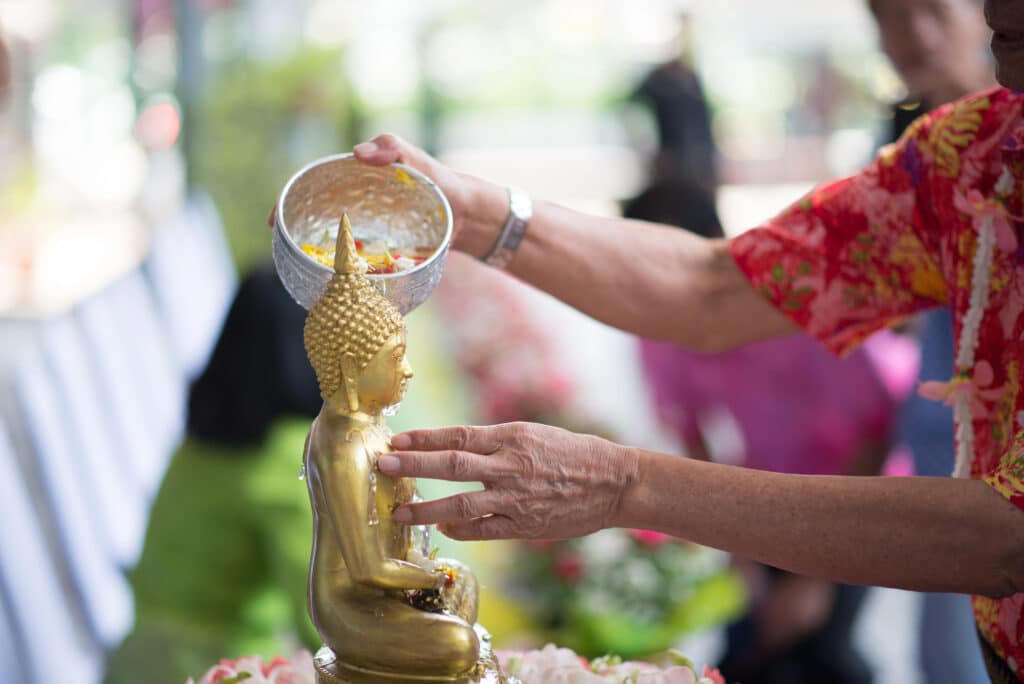
Frequently asked questions about Songkran in Bangkok
Finally, we answer some frequently asked questions about Songkran in Bangkok.
What is Songkran?
Songkran is the traditional Thai New Year festival, which is celebrated every year from April 13 to 15. It marks the transition to a new year and is both a spiritual and exuberant festival, known above all for its water fights.
Why is Songkran celebrated with water?
Water has a symbolic meaning at Songkran. It stands for purification, renewal and the washing away of bad karma from the old year. Originally, only Buddha statues and the hands of elders were doused with water, but today it has become a huge water festival.
Where is the best place to experience Songkran in Bangkok?
The most popular locations are Khao San Road, Silom Road and the area around CentralWorld. Each location offers a unique atmosphere – from wild parties to family-friendly water fights.
Can I take part in Songkran as a tourist?
Yes, tourists are welcome to join in the celebrations. Songkran is a great opportunity to experience Thai culture up close. Pack waterproof clothing and join in – you’ll soon realize how friendly and welcoming the atmosphere is.
What clothes should I wear for Songkran in Bangkok?
Lightweight, quick-drying clothing is ideal. Wear something that can get wet and take a second set of clothes with you in case you want to go to a restaurant or an air-conditioned environment later. Waterproof sandals are also recommended.
How do I protect my valuables at Songkran in Bangkok?
Use waterproof bags or pouches to protect your cell phone, money and IDs from water. These bags are available cheaply everywhere in Bangkok during Songkran. Alternatively, you can leave valuables at the hotel and only take the essentials with you.
Are there any rules I should follow at Songkran in Bangkok?
Yes, respect the boundaries of others and don’t splash anyone who obviously doesn’t want to join in, such as older people or monks. It is also not allowed to use water in temples. Also be careful when aiming water at moving vehicles – this is illegal in Thailand.
Do I have to visit temples during Songkran?
It is of course not compulsory, but a great way to get to know the spiritual side of Songkran. Visit a temple such as Wat Pho or Wat Arun to take part in traditional ceremonies or clean Buddha statues with water.
What happens if it rains during Songkran in Thailand?
Rain doesn’t affect the Songkran celebrations – after all, you’re wet anyway! Most people just carry on celebrating as the rain is often perceived as additional refreshment.
